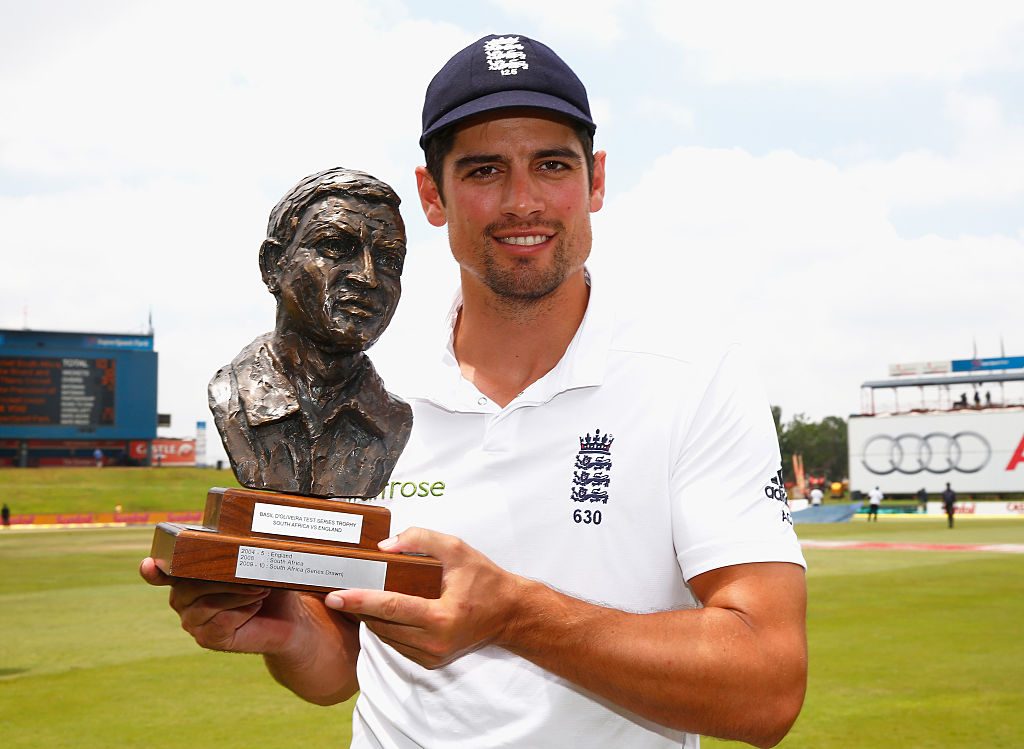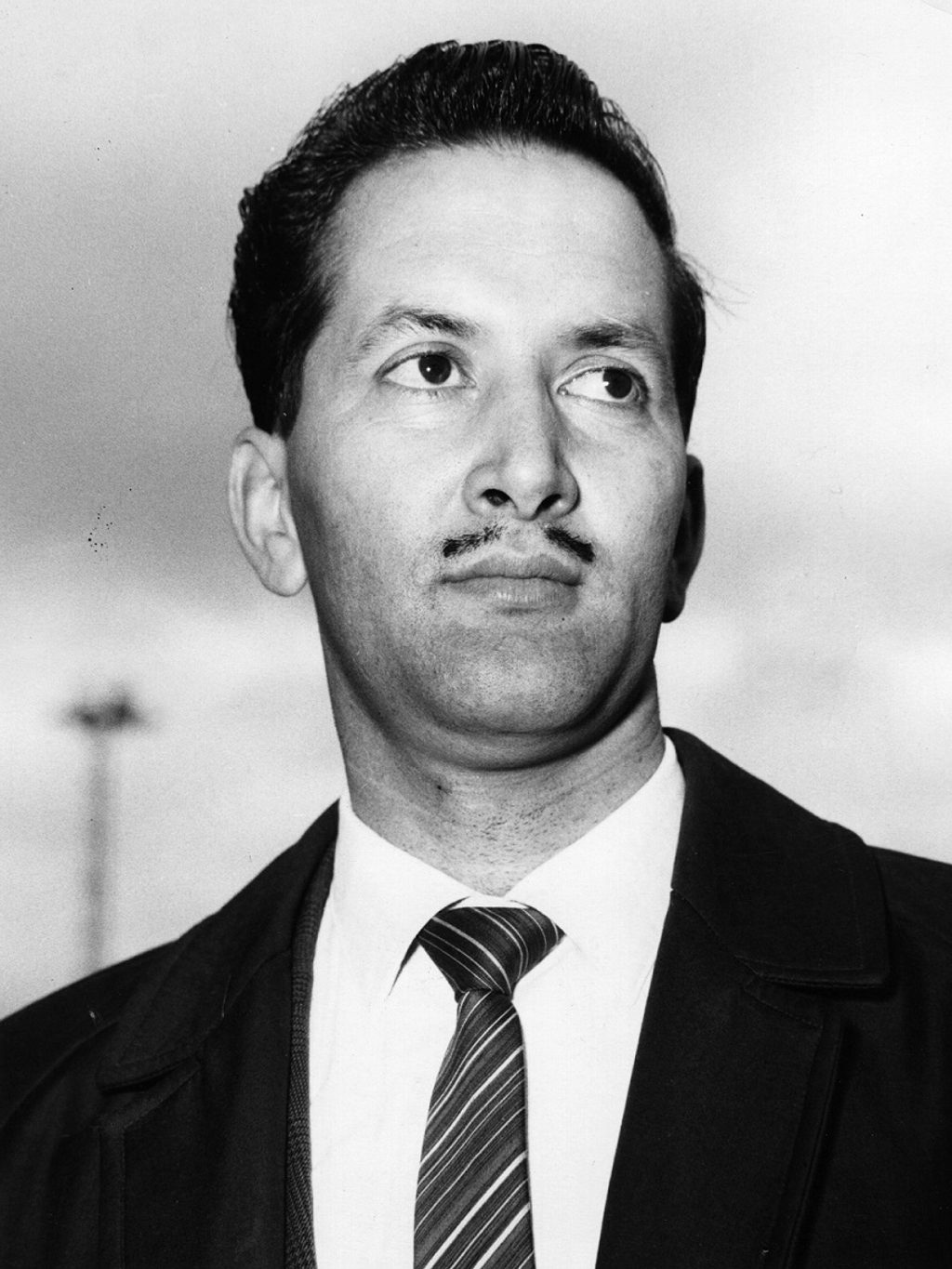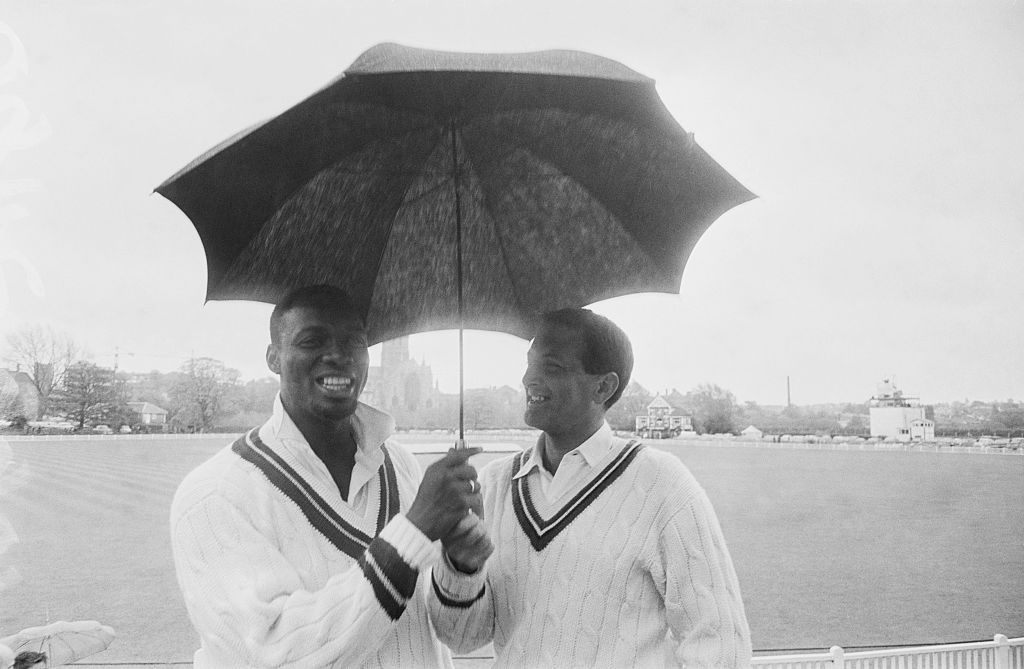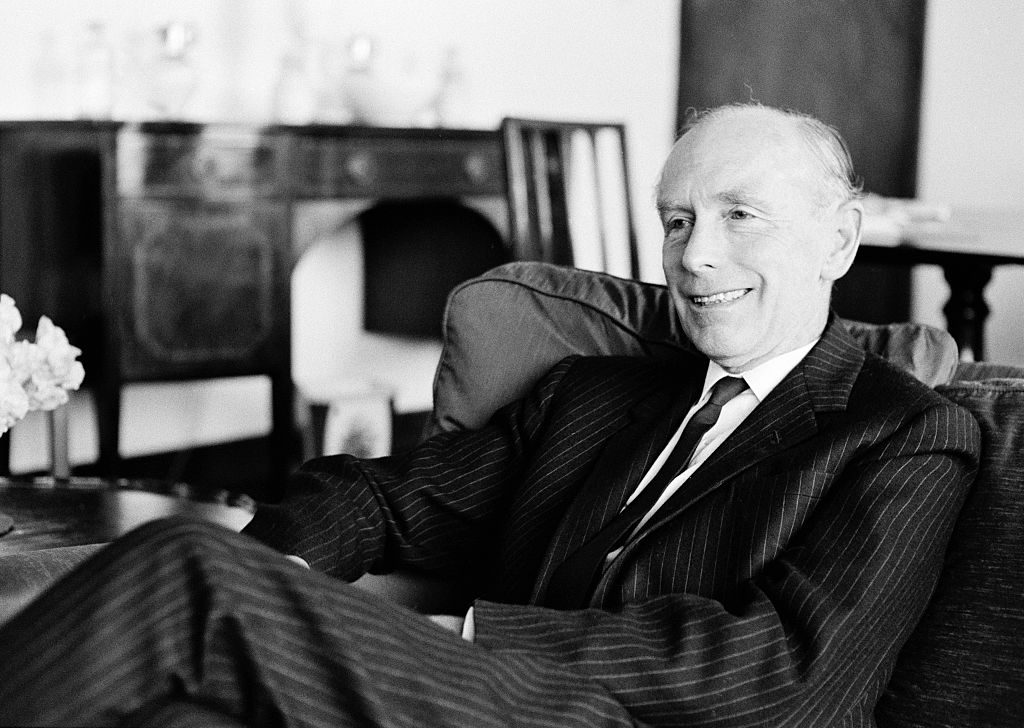
Basil D’Oliveira, who died on this day in 2011, was the central figure in one of the greatest crises in cricket history. This Wisden Almanack obituary traced his remarkable story.
D’Olivera, Basil Lewis, CBE, died on November 18, 2011. He was generally thought to have been 80. Basil D’Oliveira was a fine cricketer who, in more normal circumstances, could have played far more than 44 Tests. But the miracle of his life was that he played any at all. His story, and the 1968 crisis known as the D’Oliveira Affair, had consequences that reverberated far beyond cricket and would define Basil’s life. The man himself was not a secular saint or a political campaigner: he was, above all else, a cricketer.
D’Oliveira was born in Cape Town and grew up in the then segregated Coloured area known as Signal Hill. That much is certain; the date is more problematic. When he first arrived in England in 1960, he said he had been born in 1935. According to Pat Murphy, who ghosted Basil’s 1980 autobiography Time to Declare, he revised that figure twice, first to 1933, then to 1931. Wisden adds to the confusion, starting with 1934 then settling on 1931. But in the book D’Oliveira hinted he was even older, and Murphy said he saw a photocopy of a birth certificate saying 1928, making him 37 when he first played for England, 43 when he fended off the Australian attack in 1972, and 83 when he died.
Whatever his age, he was a phenomenon – and he would achieve an honour usually accorded only to all-time greats when, in 2004, it was announced that future Test series between England and South Africa would be for the Basil D’Oliveira Trophy.
 England’s Alastair Cook with the Basil D’Oliveira trophy after winning the 2016 series against South Africa
England’s Alastair Cook with the Basil D’Oliveira trophy after winning the 2016 series against South Africa
He grew up in a proud, vibrant and put-upon community with a strong cricket culture that was ignored by South Africa’s ruling whites well before the policy of apartheid became enshrined in the 1950s. His father, Lewis, was captain of St Augustine’s, one of a stack of clubs who played simultaneously, Indian maidan-style, on the bumpy mats and patchy outfields of nearby Green Point. Basil learned to play in the streets before graduating to his father’s team. On days off from his job in a printing works, he soon established a local reputation as both a mighty hitter and a consistent scorer, averaging about nine centuries a season through the 1950s.
He was sufficiently dominant to be chosen as captain representing “non-white” South Africa, who scored decisive home-and-away victories against Kenya. The historian André Odendaal said this gives him a better claim than Owen Dunell in 1888-89 to be regarded as South Africa’s first captain, since Dunell’s team represented a minority of the population. But when MCC toured in 1956-57, D’Oliveira, in his cricketing prime, walked seven miles to Newlands and sat incognito in the segregated area.
At the end of the decade, there was talk of a tour by a West Indian team led by Frank Worrell, but that foundered on the political rocks. D’Oliveira was on the verge of forgetting cricket, and now had other priorities: in January 1960 he married his girlfriend Naomi.
Out of the blue, a speculative job application, despairingly written in a series of letters to the commentator John Arlott in England over the previous two years, produced a dramatic reply. Arlott had contacted the Lancashire journalist John Kay, who knew the scene inside out, and Middleton of the Central Lancashire League were suddenly desperate enough to punt on an unknown as their professional. They offered only £450 for a season, feeble even then, especially as the air fare would cost £200. But Naomi, already pregnant with their son Damian, insisted Basil take the chance. A local barman-cum-sportswriter, Benny Bansda, set about raising money, and even some of the white stars played a match to help out.
He arrived in Middleton on April 1, 1960 – cold, naive about cricket and the world, teetotal, more fluent in Afrikaans than English – and made only 25 runs in his first five innings. Then he calmed down, relaxed, and scored 930 to top the league averages, a fraction ahead of Radcliffe’s pro, one Garry Sobers.
 A young Basil D’Oliveira
A young Basil D’Oliveira
The next year he returned with Naomi and Damian, bought a small house of his own, and passed 1,000 runs. He soon became a regular in the televised Sunday Cavaliers matches and on tours run by the journalist-entrepreneur Ron Roberts and the coach Alf Gover. Some of these proved racially fraught: Rhodesia had South African-style segregation, less formal but almost as pervasive; Pakistan objected to D’Oliveira’s South African passport, which prompted him to apply for a British one.
Soon several counties woke up to him, though not the obvious one: the Lancashire eminence Cyril Washbrook wrote him off as “a Saturday afternoon slogger”. Tom Graveney took a different view, and in 1964 D’Oliveira moved to Worcester to spend a year qualifying. By the time he made his Championship debut, against Essex in 1965, he was, according to the birth certificate, nearly 37. Luckily, he did not waste any more time: he made 106 – followed by 163 out of 289 on a raging turner in the return fixture a week later at Brentwood. The doubters were disappearing. He scored 1,691 runs that summer, and Worcestershire retained the Championship.
 Wes Hall (left) and Basil D’Oliveira share an umbrella, Worcester, May 1966
Wes Hall (left) and Basil D’Oliveira share an umbrella, Worcester, May 1966
By now he had confidence in himself and his method, based on a short backlift and a strong bottom hand; he had traded his old off-spin to bowl swing and cut; he had also, less fortuitously, felt emboldened to drink alcohol. The Establishment were gaining confidence too. In May 1966 D’Oliveira was named in the twelve for the opening Test against West Indies: “HELLO DOLLY!” said the Daily Mirror headline, predictably enough.
Apart from his age, he was keeping something else quiet: he couldn’t throw properly, after a car accident the previous winter. He was made twelfth man for that Test, chosen for the second and became a star in the third and fourth, with three successive half-centuries for a team that was being outclassed, including 88 at Headingley, mostly compiled in a stand of 96 with the tailender Ken Higgs that turned near-extinction for England into a mere innings defeat.
His maiden Test century arrived a year later, at Headingley against the weak 1967 Indians. He was an obvious pick now, usually batting No. 5 and often bowling first change, and beginning to build his reputation as a breaker of stands. No one queried his right to tour the West Indies that winter; indeed the speculation questions were starting about the effects of his possible selection for South Africa a year later. As early as April 1967, John Vorster, the South African prime minister, suddenly wavered from hardline apartheid and said racially mixed teams would be accepted “from countries with which we have had traditional sporting ties”. The way seemed clear for him to go.
But by now Dollymania had started to fade a fraction. He had a poor tour in the Caribbean, playing in all five Tests but averaging 22 with the bat, 97 with the ball and dropping catches. “Socially, it was a great tour for me,” he said in Time to Declare. Some felt that was precisely the point – he was now far from teetotal. He did make 87 not out in a shock defeat in the opening Ashes Test of 1968, when England ludicrously picked only three frontline bowlers, then blamed D’Oliveira for not being one of them. Now he was omitted, and remained on the outside, performing patchily for Worcestershire, while England tried and failed to recapture the initiative against a poor Australian side.
But all the while the “what-if-he’s-picked?” speculation swirled. And then came The Oval: Roger Prideaux withdrew with pleurisy, D’Oliveira came in, and the speculation ceased. He made 158, which helped win the match. He was dropped four times, but he had rediscovered his form, and triumphed. Surely there could be no doubt now? The press thought not; umpire Charlie Elliott thought not: “Oh Christ,” he whispered to Basil when the hundred came up. “The cat’s among the pigeons now.” It certainly was, but not in the way Elliott expected: five days later the tour party was announced, without D’Oliveira.
Quite clearly, all manner of dirty work had been afoot that year. D’Oliveira posed a threat to the credibility of South Africa’s policy of rigid racial separation and inequality. What if he came and succeeded? The Vorster government were desperate to avoid this, and sanctioned all kinds of bribes to persuade D’Oliveira to rule himself out, carefully detailed in a 2004 biography by Peter Oborne. MCC, with the former prime minister Sir Alec Douglas-Home high in their counsels, did not want to jeopardise their long and, from their perspective, happy relationship with white South Africa.
 Former Prime Minister Sir Alec Douglas-Home, president of MCC, circa July 1966
Former Prime Minister Sir Alec Douglas-Home, president of MCC, circa July 1966
It is possible to believe that the selectors were leaned on not to pick D’Oliveira by an unholy alliance of Lord’s and Pretoria. There was a narrow, rather convoluted, cricketing case to support his omission, based on the fact that there were better specialist batsmen and he was not quite a fully fledged all-rounder. (And he was not young, whatever his real age.) Doug Insole, the chairman of selectors, always maintained this lay behind the decision.
There is another explanation, more plausible than either, and supported by well-placed sources: that the selectors remembered the West Indies tour and took that into account, perhaps fearing a disastrous late-night incident. It is notable that the other great socialiser, Colin Milburn, was also left out.
In Cape Town, the South African parliament roared with delight when the news came through. In England, the storm broke over the selectors’ heads; MCC became an object of contempt and ridicule. Then, two weeks later, Tom Cartwright, a bowler who batted, pulled out through injury; D’Oliveira, a batsman who bowled, was inserted instead. The cricketing case for this was again elaborate, though perhaps not as elaborate as Cartwright’s thinking. He had unusual political awareness for a cricketer (probably more than the chronic appeaser Douglas-Home) and harboured mixed feelings about touring at all; it seems likely he used his twinge as an excuse.
Vorster almost certainly could not have banned D’Oliveira had he been chosen originally. With world revulsion building against apartheid, that would have been too nakedly racist, even for South Africa. But now he had his chance because it looked, not just in South Africa, as if the selectors had caved in to political pressure. The night after D’Oliveira’s inclusion Vorster was speaking (half-drunk, it is said) in the heartland of white supremacy, to members of the Nationalist Party in Bloemfontein. He was able to tell them: “The MCC team as constituted now is not the team of the MCC but the team of the Anti-Apartheid Movement.” He got a phenomenal ovation. D’Oliveira would not be allowed in, and MCC had to cancel the tour. Short-term, Vorster had won. But both Vorster and apartheid would be dead before South Africa played cricket against England again, and the sporting isolation created by banning D’Oliveira marked the start of the regime’s painfully slow downfall.
Only one man emerged with credit. D’Oliveira made a habit of rising to the major occasions of his life, and he behaved throughout this one with integrity, dignity and implacability. In the years of political strife ahead, he would not let himself be used by either the rigid boycotters or apartheid’s apologists: he remained his own man. He played on for England; indeed for the four years after the great rumpus, he did not miss a match (so much for the selectors’ original judgement). His performances included perhaps his greatest innings: an unbeaten 114 on a shocking pitch at Dacca in the hastily arranged, riot-torn series that replaced the abandoned South African tour. And he continued to play well for Worcestershire until 1979, when he may well have been past 50. He then became county coach for 11 years, forming a notably successful partnership with Phil Neale as captain.
 Worcestershire and England cricketer, Basil D’Oliveira at New Road, 1983
Worcestershire and England cricketer, Basil D’Oliveira at New Road, 1983
D’Oliveira had always been a good watcher – he worked out how to pick the Australian mystery spinner John Gleeson – and he was a conscientious, tough and effective coach, if stronger on the importance of mental attitude than on the minutiae of technique. And his essential decency shone through in odd ways. The former county secretary Mike Vockins remembered him being saddled with a coaching commitment at a school in Redditch on a snowy day. He was not sure he could make it, so he drove there in the morning to convince himself it was possible, then went back to do the job in the afternoon. Basil also became a proud patriarch.
His son Damian played 14 seasons for Worcestershire, and in 2011 his grandson Brett followed them into the team, and also became the fourth generation of D’Oliveiras to play for St Augustine’s. By then dementia had overcome Basil, but his family – led by the staunch Naomi – sustained him. And he was revered across the cricket world, most of all, far from Worcester, in the country that once spurned him.








